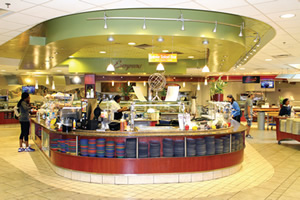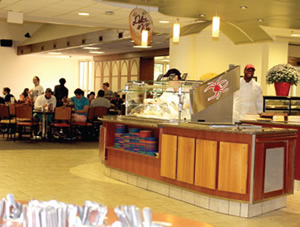A Tale of Two Auxiliary Departments

PHOTOS COURTESY OF THE UNIVERSITY OF RICHMOND
The trend of outsourcing auxiliary operations like food and custodial services has been going strong on college campuses for years. The business argument for it is solid: outsourcing frees up staff and might even add a bit to the coffers. But mostly outsourcing allows schools to focus on their core mission. “Job one of any school is providing an education,” says Dr. Richard Vedder, director, the Center for College Affordability and Productivity. “If an outside company can do the other things better, that should be welcomed.”
But some schools still choose to keep these jobs in house. This approach allows complete control over the services, staff, budgets and outcomes. It can even provide a path for growth, moving hourly employees to management positions.
Two directors talk about their different methods and approaches. Either one, or a blend of the two, might be right for your school.
Home Grown
Jerry Clemmer, director of residential dining, University of Richmond, in Virginia, is a big believer in keeping everything in house — so much so that he’s created the Leadership in Development (LID) program. This year-long program trains a handful of hourly employees in various managerial subjects. While there is no obligation to promote the graduates, ten alumni have moved up to better jobs within the university’s dining system.
Examples of promotions include cooks and cashiers who moved to assistant management positions, hourly employees who moved to coordinators and a barista who advanced to manager. Candidates must write an essay outlining why they should be admitted to the program.
The program itself is quite rigorous, including sections on employment law, contracts, bidding, safety and management theory. There are reading assignments, written homework and discussions. The class culminates with students applying what they learned by putting on an international dinner for 2,000.
Now in its seventh year, the LID program takes a large investment in resources, both financial and time. “I provide the books, prepare the lectures and grade the papers,” says Clemmer, who also notes that students are paid for their hours in class and while working on projects, homework and quizzes. “It ends up costing between $1,200 to $2,000 per student for the year.”
So why would the University of Richmond choose this path?
Clemmer presents two arguments. “It takes about $3,600 to hire for a management position,” he says citing costs like advertising, interviewing, training and uniforms. “Then it takes six months to get a new hire up to speed.” Even after this process he calls every new hire a “roll of the dice. You don’t know their work habits and they don’t know our culture.”

PHOTOS COURTESY OF THE UNIVERSITY OF RICHMOND
Training from within eliminates those unknowns. And with baby boomers getting ready to retire, a cohort of management-ready staff promises smoother transitions.
But of course there’s something else at play. The LID program offers opportunity to people with limited schooling and fewer options. “People think these kinds of jobs offer no future, but there is a future here,” says Clemmer. “Even if they don’t get promoted, something good always comes out of the class. I had one student, a line server, who liked the accounting part so much she’s pursuing a B.A. in it.”
Outsourced
Darin Matthews, director of Contracting and Procurement, Portland State University (PSU), Oregon, has taken the other route, and outsources custodial and food services. “We use our human capital for educating students. That is our core competency,” he says.
Still, Matthews knows that hiring outside firms can be a politically charged move. “Our employees are unionized and if we were to outsource and displace those jobs we would need to work through some issues.” Matthews dodged that bullet as the two firms that provide these services are union shops, too.
But the union question is just one part of a successful relationship between contractor and college. “Our contracts are very prescriptive,” says Matthews. Along with service outcomes, PSU contracts also include conduct requirements, and a one-strike-and-you’re-out policy.
Matthews tells of having to enact that policy once. “We used a medium-sized custodial service provider who didn’t do a proper background check on their employees,” he says. After some thefts and inappropriate comments to students Matthews terminated the contract. “You shift a lot of the risk when you hire a contractor, but you lose a lot of control, too,” he explains. “If you don’t include explicit expectations in your initial contract you can’t address any future problems.”
Matthews notes that students don’t really notice, or care, if a service is outsourced. They just want clean buildings and affordable food. If rooms are dirty, they’ll complain. If the food is expensive or bad, they will eat at one of the many off-campus options available in the urban setting.
Contracts at PSU offer a four- to five-year initial term and if all goes well, the option for a two-year renewal. While the financial benefits are always part of the decision matrix, Matthews reports that in many cases there are little significant savings. Sometimes it’s a wash.
So why do it at all? Again it comes down to core competencies and having a school that focuses on teaching. “Why should a school be in the food service or custodial business?” asks Dr. Vedder. “Schools should focus on what they do best. This is a welcomed trend.”
PSU doesn’t outsource everything. They have their own labor force for small and medium building construction and maintenance projects. “Large capital construction is bid out and often these companies will offer their services for smaller projects,” says Matthews. “I don’t think that would work for us. We have a balance that doesn’t need to change.”
Still, Matthew cautions auxiliary departments to do due diligence, complete with a thorough analysis — and don’t trust the marketing people who may make more promises than they can deliver. “I’ve seen the best and the worst,” he says. “A good model is competitive and offers high quality. When you find it, stick with it.”
This article originally appeared in the issue of .